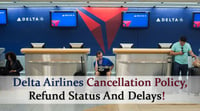Delta Cancellation Policy: Rebooking Coronavirus Extended for 2 Years
Right now, it's one of the most flexible rebooking policies for airlines.
Anyone looking to travel this spring or summer is likely to become increasingly familiar with the ever-evolving rebooking and refund practices of airlines.
There is a lot for potential air travelers to figure out in the face of a barrage of flight bans, shelter-at-home orders, and frequent airline route suspensions due to coronavirus. The Delta Airlines cancellation strategy has made the procedure on its fliers a little easier: the airline expands the time window to rebook flights for more than two years.
The policy is to offer "some extra breathing room," to its clients, a Delta release states. And it's sure to be a welcome improvement in a timeframe when travel activities remain unpredictable due to the epidemic. Some U.S. airlines offer passengers with a travel allowance for the expense of their tickets, but a law that more drastically restricts the choice of travelers going forward stipulates that travel must be done within a year of the initial ticketing date. Delta has been joined by a number of the bigger carriers, including United and American, and has expanded its voucher booking windows past the usual 12 months.
Tickets usually expire one year after purchase, but we offer waived change fees and greater flexibility to travel through September 2022, according to Delta's policy. The new rule applies to all passengers with tickets booked for travel in April or May 2020 as of April 3, or with existing travel credits or canceled flights from March, April or May 2020. Any customer with an applicable credit will be able to travel in April or May 2020.
The Delta termination program is highly flexible and, in the form of a travel credit, can benefit passengers who no longer wish to fly or others who prefer refunds. But it is important for passengers to know In some cases, they might, instead, be entitled to a cash refund. According to Department of Transportation rules, if any carrier operating within the U.S. cancels or adjusts the date of a flight substantially, it must give a cash refund to passengers, not just a travel credit.
"If your flight is canceled and you choose to cancel your delta trip as a result, you are entitled to a refund for the unused transportation—even for non-refundable tickets," says the Airline Customer Rights website of the DOT. "You are also entitled to a refund for any bag fee that you paid, and any extras you may have purchased, such as a seat assignment."
Recently, the DOT said it had received so many concerns from travelers unable to secure a refund that a compliance notice reminding airlines of its regulations was released. "The Department is receiving an increasing number of complaints and inquiries from ticketed passengers, including many with non-refundable tickets, who describe having been denied refunds for flights that were cancelled or significantly delayed," the compliance notice states. "The passengers claimed in each of these cases that the carrier told them that they will earn coupons or credits for future travel. Carriers have a long-standing responsibility to provide a ticketed passenger with a timely refund when the airlines cancel Delta flight of the passenger or makes a substantial adjustment in the timetable of the flight, and the passenger decides not to consider the option proposed by the carrier.
The compliance notice goes on to state that, considering the coronavirus effect, the DOT will allow airlines a grace period to comply with the legislation by notifying cancelled flight passengers with vouchers that they are entitled instead to a cash refund.
We focus on how COVID-19 influences travel on a regular basis. Here you can find all of our coverage of coronavirus and travel services.
Read Also:
United Airlines Cancellation Policy
American Airlines flight Cancellation Policy
Jetblue Cancellation Policy
Alaska Airlines Cancellation Policy
British Airways Cancellation Policy
Allegiant Air Cancellation Policy
